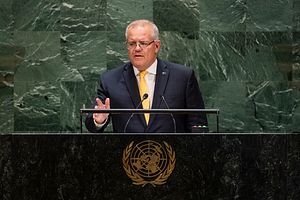As the former managing director of Tourism Australia, Australian Prime Minister Scott Morrison knows a thing or two about marketing and its political equivalent: Spin. Morrison, or “Scotty from marketing” as he has been dubbed by Australian satirical publication The Betoota Advocate, has often opted for spin and questionable data rather than substantive policy responses.
Nowhere is this trend more clear than in Australia’s climate change policy, which has again been thrown into the spotlight as the country has literally burned over the last few months. Since 2014, when Morrison’s Liberal-National coalition government dismantled the Labor Party’s carbon pricing scheme, emissions have generally trended upwards. The Coalition’s replacement policy, the Emissions Reduction Fund – where polluters are given public money to reduce their emissions – has been roundly criticized for being both ineffective and inefficient.
No matter. Rather than making policy changes – like implementing a badly-needed national energy policy or a market-based carbon pricing mechanism – Morrison has done his best to try and conform reality to his political preferences. Despite Australia having some of the highest per capita emissions in the world, Morrison has attempted to ease political pressure by selectively pointing to a per capita decrease in emissions. While a decline in per capita emissions is a positive, the total emissions that a country produces is obviously far more material for both the environment and international treaty obligations.
Another favorite refrain of the Morrison government is blaming India and China – and conveniently not Australia’s alliance partner, the United States – for climate change. This ahistorical line of spin ignores the reality that developed countries like Australia have historically contributed far more to climate change than these two developing countries, who ironically continue to have very low per capita emissions. It is precisely because of this historical reason that the Paris Agreement allows developing countries more time to reduce their emissions and creates a Green Climate Fund – which Australia has stopped funding – to ease developing countries’ transition.
Last month, the government spin machine went up another gear, as political furor erupted over Australia’s bushfire catastrophe and Morrison’s poorly-timed and secretive holiday to Hawaii. Of note was the government’s move – with little transparency or explanation – to alter Australia’s historical emissions data by factoring in adjustments to soil carbon data, which have declined because of the country’s severe drought. With this alteration, the government can now perversely take credit for the drought and claim that total emissions have actually decreased rather than increasing during its period of office. Conveniently, emissions released by bushfires are not factored into this new model.
Perhaps Morrison’s most egregious example of emissions spin doctoring to date has been his repeated claim that Australia will meet its modest target under the Paris Agreement of reducing emissions to 26-28 percent on 2005 levels by 2030 “in a canter.” Barring further policy action, this highly misleading claim will rely on Australia using its controversial 370 million tonnes worth of “carryover credits,” which effectively reduce Australia’s target to a 16 percent emissions reduction. At the recent Madrid climate change conference, the Morrison government came in for heated criticism from almost 100 countries for being the only nation – at least openly – planning to use the credits.
Morrison’s spin addiction has also filtered through to the economy and foreign policy. Low growth, falling consumption, high household debt, and sluggish wage growth underlined the OECD’s assessment of the Australian economy as “weak.” To convince Australians that the economy is actually fine, Morrison and his Treasurer Josh Frydenberg have assiduously pursued a budget surplus, which will likely be delivered in this year’s May budget.
The relentless pursuit to get the budget “back in black” has stymied much-needed funding for a range of social issues like mental health, aged care, and unemployment benefits. Moreover, a budget surplus is just one of many economic indicators and does not always necessarily make for prudent policy. Indeed, instead of implementing economic stimulus as advised by the IMF and many economists, the government has relied on the Reserve Bank of Australia to cut interest rates. Even though the government’s obsession is potentially endangering the economy, in Morrison’s world of heavy spin, a budget surplus will cement the government’s unparalleled economic management credentials.
In foreign policy, Morrison displayed his love of selectively using statistics when he urged China to admit that it was no longer a developing country because of its growing global power. This needless piece of megaphone diplomacy overlooked the poverty of China’s interior and western regions as well as the fact that China’s “developing country” status at the WTO has actually accrued it relatively few benefits. In a similar vein, Morrison’s announcement of AU$500 million in funding to the Pacific for climate change adaptation and mitigation – after Morrison’s clash with Pacific leaders over emissions reduction ambition at the Pacific Islands Forum in Tuvalu – was portrayed as new money, despite it actually being repackaged funding.
Morrison is far from the first Australian politician to have a penchant for spin doctoring, nor will he be the last. However, Morrison’s belief in his own supreme marketing abilities appears to have taken levels of spin to new heights. This can only have negative consequences for Australian public policy and indeed the country’s credibility and international relations.
Henry Storey holds a Master of International Relations degree from Melbourne University. He is an editor at Foreign Brief and currently works as an analyst for a political risk consultancy in Melbourne.

































